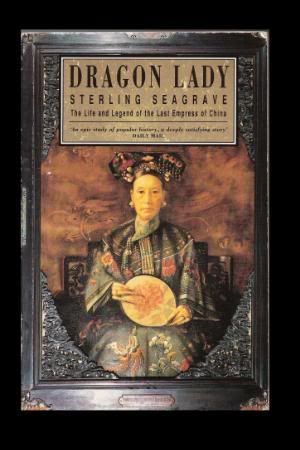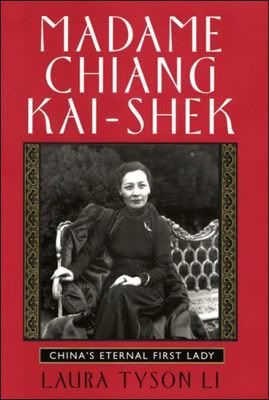 Wild Swans: Three Daughters of China by Jung Chang, is one of my all time favorite books and I highly recommend it as a great read. This is a non-fiction account of a daughter, mother, and grandmother figuring out how to get along together while coming from their various eras. There's a great timeline giving what was happening personally and politically in China. The first paragraph of the Epilogue is what pulls you in to read about this family of strong women.
Wild Swans: Three Daughters of China by Jung Chang, is one of my all time favorite books and I highly recommend it as a great read. This is a non-fiction account of a daughter, mother, and grandmother figuring out how to get along together while coming from their various eras. There's a great timeline giving what was happening personally and politically in China. The first paragraph of the Epilogue is what pulls you in to read about this family of strong women.
"I have made London my home. For ten years, I avoided thinking about the China I had left behind. Then in 1988, my mother came to England to visit me. For the first time, she told me the story of her life and that of my grandmother. When she returned to Chengdu, I sat down and let my own memory surge out and the unshed tears flood my mind. E decided to weite Wild Swans. The past was no longer too painful to recall because I had found love and fulfillment and therefore tranquility."
Wow! Well, I couldn't leave this wonderfully rich world behind so picked up Cao Xueqin's The Story of the Stone [also known as The Dream of the Red Chamber, volume 1 - The Golden Days]. Called a great novel of manners in Chinese literature, I struggled to get through, but I did. Then, for a trip I picked up volume 2 - The Crab-Flower Club, and my bookmark is still set to page 135. These books are beautifully detailed, most likely too much for me at that time in life. The Jia family is at the center, but my memory is that it was more about the son and how cherished and beloved he was.
 Okay, so my second foray wasn't a success, but I was far from done. The next book I picked up was Dragon Lady: The Life and Legend of the Last Empress of China by Sterling Seagrave. Oh man, yes, this was another gem! While this woman is often remembered as a monster, the book takes you to her beginnings:
Okay, so my second foray wasn't a success, but I was far from done. The next book I picked up was Dragon Lady: The Life and Legend of the Last Empress of China by Sterling Seagrave. Oh man, yes, this was another gem! While this woman is often remembered as a monster, the book takes you to her beginnings:
"We do not even know her name. She was too private for that, and the world she lived in was uniquely designed to hide her behind multiple layers of court ritual and etiquette. Nobody ever spoke the name of the Son of Heaven or his wives, because they were demigods. She was born on November 29, 1835, the sme year as Robert Hart, somewhere in China, bu where exactly we do not lknow. Nor are we sure of her father's name or occupation, the name of her mother, or event the girl's mil-name, the name she was called as a nursing infant. She was an obscure daughter of an obscure Manchu officer and might have lived out her life in obscurity except that she was chosen to be one of the emperor's lesser concubines and had the good fortune to bear him his only surviving son. Thanks to Hart we know that she had three younger sisters and one brother who survived to adulthood. It is also a matter of record that she was fond of pretty clothes, Pekingese dogs, and chrysanthemums."
This non-fiction account of Tzu Hsi is simply rich. This woman went from being considered nothing to everything. What could possibly be next? I tried Marina Warner's The Dragon Empress, but it wasn't fulfilling so my quest for something more for the China section of my collection went unfulfilled for some time before it was broken.
While in Canada I was trolling through a bookshop and found Dragon of Heaven: The Memoirs of the Last Empress of China, story by David Bouchard and paintings by Zhong-Yang Huang. YES, finally, a scruptuous visual to go with all the words floating in my head. I love this book and often give it as a gift.


So, is my China collection closed?
 Nope. This year the cutie bought me Madam Chiang Kai-Shek: China's Eternal First Lady by Laura Tyson Li. I haven't finished this book yet, time and work snuck up on me, but so far she's interesting. I'm already curious about her family so the next book might be The Soong Dynasty by Sterling Seagrave - I liked how he wrote the Dragon Empress so we'll see.
Nope. This year the cutie bought me Madam Chiang Kai-Shek: China's Eternal First Lady by Laura Tyson Li. I haven't finished this book yet, time and work snuck up on me, but so far she's interesting. I'm already curious about her family so the next book might be The Soong Dynasty by Sterling Seagrave - I liked how he wrote the Dragon Empress so we'll see.
So there you go, another peek into a tiny part of my book collection.
Monday, November 12, 2007
Book Talk!
Subscribe to:
Post Comments (Atom)



No comments:
Post a Comment